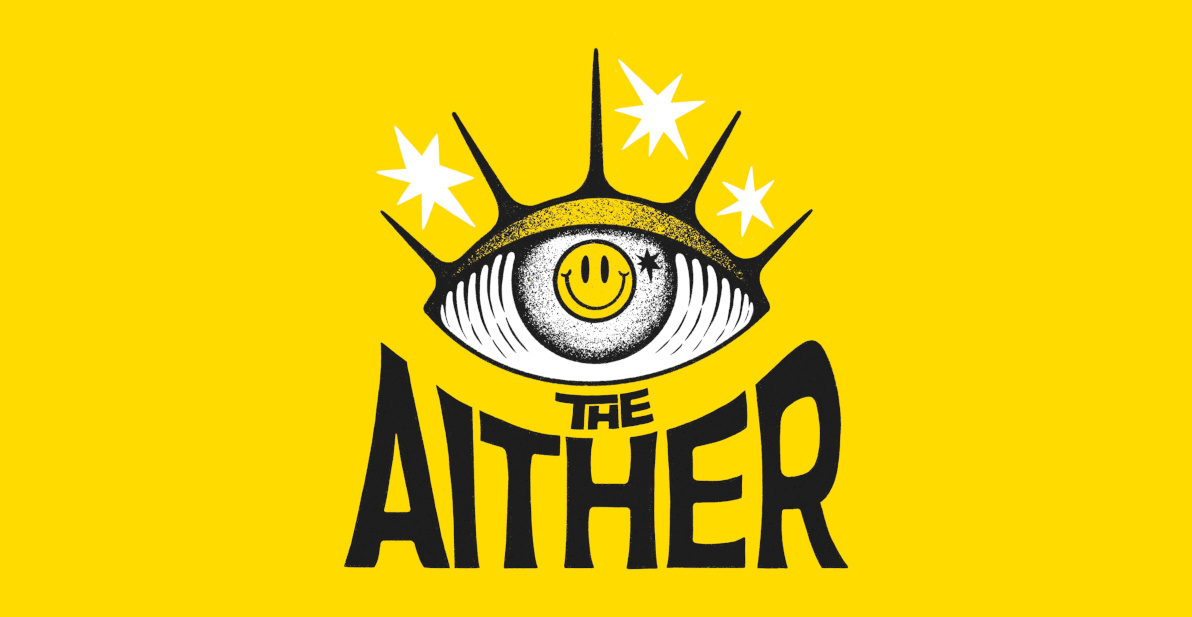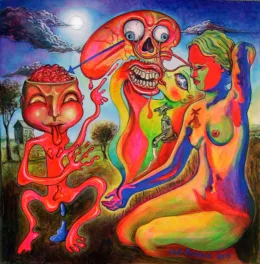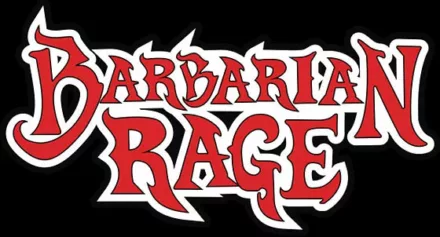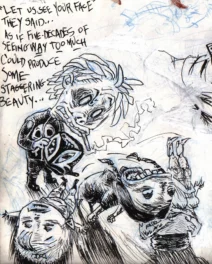New York writer Olivia F. Cieri / O F Cieri has developed a unique voice over the past decade. One which has gained volume in recent years – like a blowhorn sounding out a rallying call over a riot. Holding nothing of herself back; her vulnerabilities, flaws and humanity are in the very warp and woof of her words.
Born in New York, on September 17th 1991, the oldest of four children, she contributes much of her creative development to her home life growing up – Both her parents were part of different New York art scenes. Her mother a dancer and her father a collector, who taught her to pursue what most interested her and not what would pay out immediate financial dividends. This led Olivia to being well versed in many areas. With her influences ranging from Eoin Colfer, Tolkien, William Burroughs and Hunter S. Thompson – To history, comics, archaeology, music, anthropology, cyberpunk and the occult.
Olivia’s writing began to get noticed when she won a poetry contest while attending City University of New York (CUNY) in 2013, going on to also receive an honourable mention for her prose piece ‘The Mirror’ three years later. In 2019 she began publishing regularly online and in print, starting with her story ‘Suicide Pact.‘
Her work has since ripened – Publishing reviews, essays, and even a horror audio drama called ‘Beach Bay Carnival Grind’ to ever increasing acclaim.
Her first novel ‘Lord of Thundertown‘, an urban fantasy, published by Nine Star Press, was released in 2020. With her most recent book ‘Lockdown Laureate‘, a collection that showcases a cross section of her varied writing talents and interests, being released earlier this year through Castaigne Publishing.
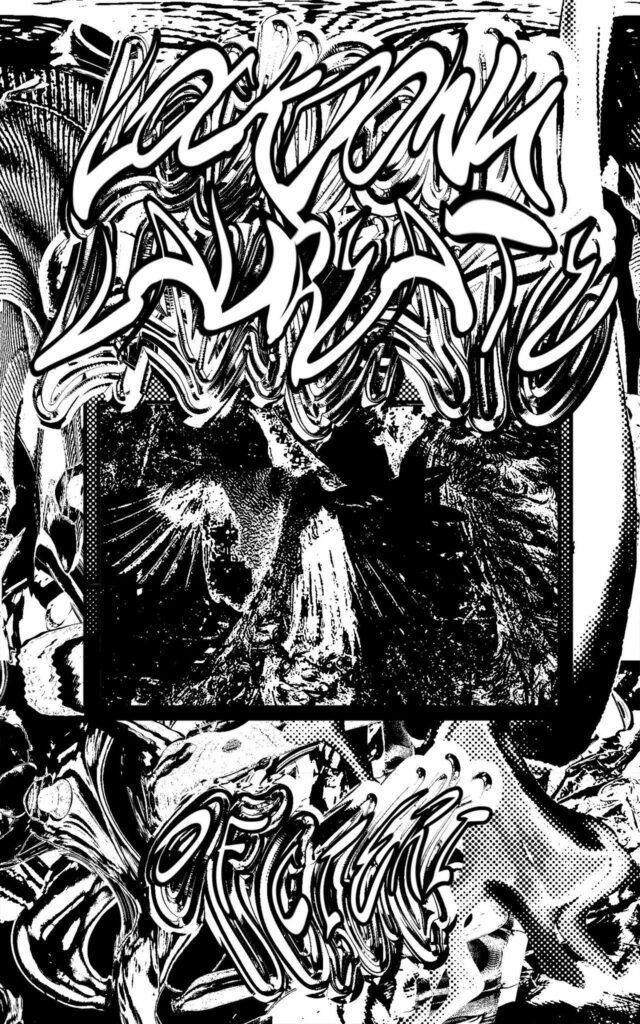
Published by Castaigne Publishing earlier this year.
Her forthcoming book Backmask will be released this coming June through Malarkey Books.
Coming even further down the pipeline is yet another novel, still untitled, “About a man,” Olivia tells me, “who is brought back to life by his estranged wife; and his efforts to get her sentence for the illegal resurrection expunged.”
Concurrently, Olivia’s also working to place more non-fiction pieces and podcast scripts; and, more personally, is engaged to her partner of over ten years; and considering the idea of constructing a house to cement the union.
To discover more about what makes Olivia tick, she agreed to a conversation over Zoom…
Entering the meeting, she popped on screen in her brick-walled apartment, wearing clear framed glasses, chain necklaces, and a punk-cut shirt bearing an infinity-shaped serpent.
Following our initial chat, Olivia also gave me a Tarot reading, which we conducted over email and is also included here – I sent her my question and she emailed me later to let me know what she saw in the cards.
Take a look into the strange loop that is Olivia’s world below…
PO: How old are you?
OFC: I am 31.
PO: I wasn’t sure if you were trying to keep it secret, I couldn’t find an exact date.
OFC: I’m just a millennial, I’m used to you never putting your age on the internet no matter what.

PO: What does the F in O F stand for?
OFC: Francesca.
PO: I was going to go with Farquhar, but I was like no, that’s prolly not right.
OFC: Damn dude, listen I just got this haircut.
PO: I like it I think it looks good. I like your style.
OFC: Thank you, thank you.
PO: Where do you work?
OFC: I work in a computer manufacturing factory which is pretty cool. Because it means that they are reutilizing old space in New York that was originally zoned for industrial, it’s Soho. But Soho nobody thinks of that as industrial space anymore even though all of the buildings are designed for industrial space.
So we get a little bit of a tax rebate for using the space as intended. As well as the company being a female-run tech company. But I just work in the shipping department.
PO: When did you stop working at Obscura Antiques and Oddities?
OFC: I stopped working—well they closed down. But I stopped working there in about 2014.
So Obscura was originally Ride the Dragon or The Dragon Trading Company or something like that. This was back in the nineties… the original owner… sold it to Mike Zohn and Evan Michelson. And they were always just business partners, they had very different interests in terms of what they wanted to sell there in the store.
If you go on Instagram you will see that Mike is the one who is currently running Obscura Antiques Instagram.
And so it’s a lot of gag gifts, a lot of carnival stuff and a lot of things focused more on like antique novelties, where if you go to – I think it’s Obscura East – It’s Evan’s account and she specializes in the medical antiques and the funerary antiques.
PO: So, some of the pieces in ‘Lockdown Laureate’ were previously published and some of them were from the start of the pandemic, how did that come together?
OFC: So, while I was in the pandemic, I broke whatever mental block I had around writing short fiction. Because prior to that I was writing long fiction which gave me a lot more space to get to whatever idea that I wanted to get to.
But for some reason it was much easier to get to the point much quicker in quarantine.
As for the things that were published and things that were not – I was sending all of the stuff out but not all of it was accepted, which happens.
PO: How many pieces, there’s 22 – we’ll get into the number 22 later – but what percolated those particular pieces?
Was it like mixing an album, or it just felt right?
OFC: It did feel a lot like mixing samples.
I think I mention that in a couple of the pieces where it’s just a bunch of thoughts repeating over and over again.
PO: How did you get hooked up with the illustrators?
OFC: I think I was actually following Soren before I started to get involved in writing indy lit on Twitter.
I think that he was one of the people – cos normally when I go on Twitter and I see a really cool illustration I’ll just automatically follow that person so I can keep tabs on them.
And then yeah Rachel was getting published before me, I was seeing her graphics and her poems around before, and once again just automatic follow on somebody whose illustrations I like.
You know she’s a really good poet as well.
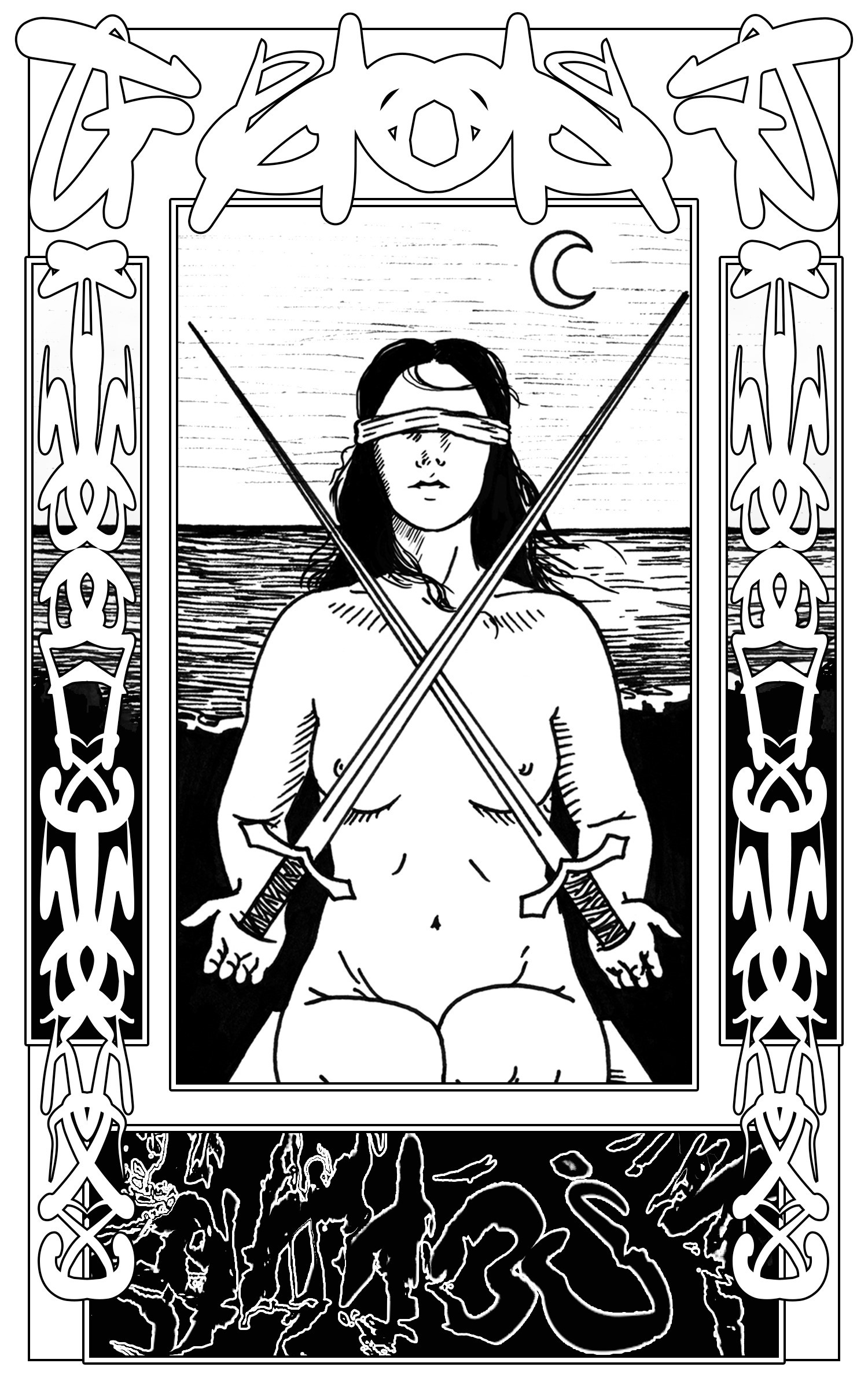


Some of the illustrations from O F’s book ‘Lockdown Laureate.’
Art by Rachel Lilim & Soren Haxan.
PO: Do you guys hang out, do you get together read poems to each other?
OFC: I have no idea where she is.
PO: When I was looking into Rachel’s stuff, I also saw one of your things, one of your poems ‘Nightmare Fuel.’
How come ‘Nightmare Fuel’ did not make it into the collection?
OFC: ‘Nightmare Fuel?’ I don’t remember that. OH! No, I don’t.
Which one is that?
PO: That’s a deep cut.
It was… it’s hard to describe. It’s like a fantasy type poem.
With all kinds of… I don’t know, it’s indescribable.
OFC: Where was it published?
Do you remember?
PO: SludgeLit.
OFC: I didn’t actually try to republish anything on SludgeLit which might have been a mistake.
Now I’m looking back at old SludgeLit (Searches on her computer.)
Yeah, I was really disappointed when Tony stopped this cos it was great, right? It was such a good idea.
Oh, this one, yeah! I think the reason why I don’t remember it is because I didn’t – cos like the original conceit behind SludgeLit was that it was going to be people’s phone notes.
Cos poets are always talking about how they have a bunch of phone notes that they publish their poems in.
And then after a while Tony was like ‘Since you guys keep posting weird fucking images why don’t you combine those two things?’ And he was the one who called this ‘Nightmare Fuel.’
So, I always think of this as the cabbage patch nightmare land.
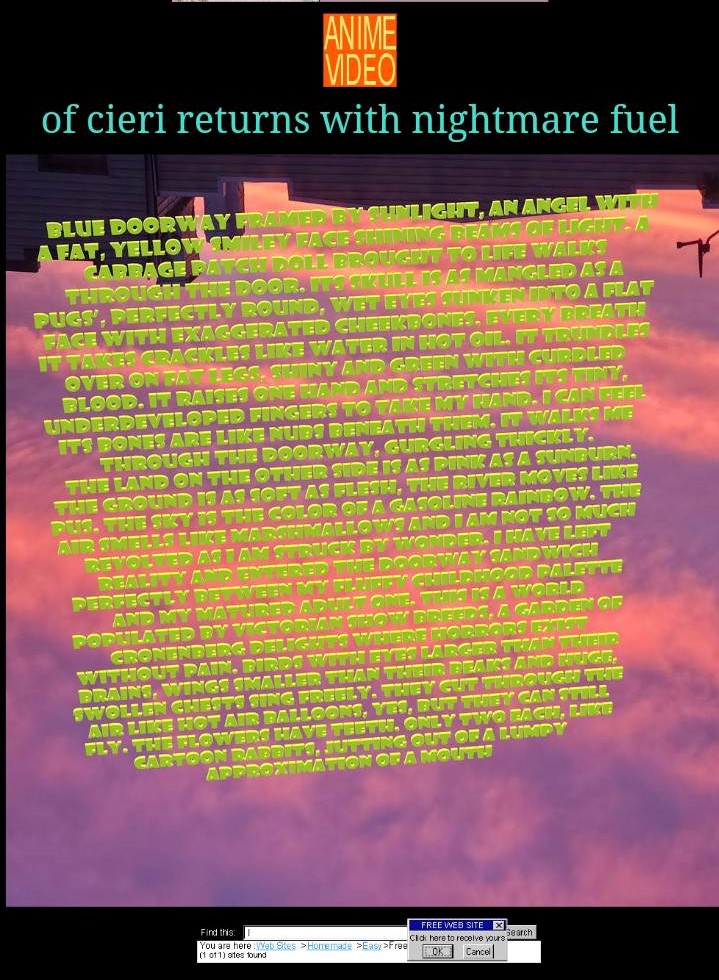
O F’s work Nightmare Fuel – Originally published via ‘SludgeLit.’
PO: Yeah, that’s right.
That also explains why there is no punctuation, it’s just a big chunk.
I like that.
OFC: Yeah, put in the interview: Tony, why did you stop SludgeLit?
Start it up again!
PO: Okay, that’s going in.
OFC: Alright, thank you.
PO: So, just to recap, it was just you followed them on Twitter and you reached out to them,
‘Hey I’m coming out with a collection, why don’t you guys collaborate?’
You hooked those two up to do the illustrations?
OFC: So, it’s a 22 story collection, which is a lot, but a lot of them are only a page long or less. Two of them are only a couple of lines.
And so, Evan, the publisher of Castaigne, reached out and said, “We’re trying to beef this up a little bit we’re probably going to put a couple of blank pages in it. But we were also thinking about illustrating it. We thought that would make it a lot more worthwhile.
Who would you want to illustrate it?”
And I was like, “How about Soren? I love his stuff.” And Evan said, “That’s really cool,” and then he was like, “Ok so somebody is going to have to do the cover,” cos basically we reached out to Soren and we said, “Do you have anything that you’d be happy with us reproducing? Nothing new for the book just something that is already in your portfolio.”
And so that’s what he sent us.
And then we were talking about the cover and he (Evan) gave me two options and I don’t remember who the second guy was cos Rachel was in the list and I was like, “I want Rachel.”
And so, he was talking to me and he was like, “Would you mind if Rachel did remixes of all of Soren’s illustrations?” And I was like, “No, no I would not fucking mind if Rachel did remixes of Soren’s art.”
And then she started reaching out to me, and she was like, “Is this ok?” And I was like, “Yes.”
Every single time she was like, “Is this ok?”
“Yes. Yes. Yes.”
PO: Did she do the backwards lettering?
OFC: Yeah.
So, Soren does traditional pen illustrations and then she’s (Lilim) the one that does all the digital stuff.
What I really like about Rachel’s art is that she hits this thing where the original surrealists were really trying to get at, where you first look at it, it could look like something, you look at it a little bit longer, it doesn’t look like that thing anymore so you continue to look at it to either find that original thing that it used to be or you look for the parts of it that were making up the original silhouette that you first saw.
She’s really really good at that kind of dream logic that surrealists were trying to get at.
PO: Who thought up of structuring it around the Tarot, the 22 Major Arcana?
OFC: That was kind of accidentally with Soren, because he had been working on a Tarot deck, and I would never do that because it sounds like a lot of fucking work, and I don’t know if he’s still doing it, but he has taken a break at least and he was willing to let us use some of that iconography that he was coming up with.
I tried to make them fit with the iconography.
There was a lot of swords which didn’t always work for the pieces.
PO: There’s a lot of sickles and scythes in the illustrations – I tied that into the pandemic levelling out of a part of our society, the status quo, was that a conscious thing?
OFC: Well, scythes and swords are definitely traditionally symbols of divine illness, so for example Apollo’s weapons were always arrows that could either heal or kill. In the ‘Iliad’ they describe people being cut down by invisible arrows where they stood and just dying in their own blood.
The same is true in the Bible where they describe the angel of death cutting people down, so this is a fair analysis to make.
But once again Soren was working on a Tarot deck and stopped around the sword section.
I also think that the other side you need to imagine this on is a kind of a reappraisal of masculinity through a queer lens. So, using much more phallic imagery and using it as a way it has always been intended to, but as a method of self-defence and as a reclamation for people who are constantly being told that they are not naturally supposed to be wielding these weapons.
PO: Do you practice Tarot?
OFC: Yes. I’ve got a bunch of decks.
My mom got me this woodcut style.
I have the original Rider-Waite obviously, cos I really do love Pamela’s illustrations, and then I have the CBD tarot, the Marseille tarot.
PO: How long have you been studying/practicing Tarot?
OFC: Now that I think of it, it’s probably been more than ten years. I don’t think I give myself the credit for that because I only started doing any in-depth studying in the past two or three years.
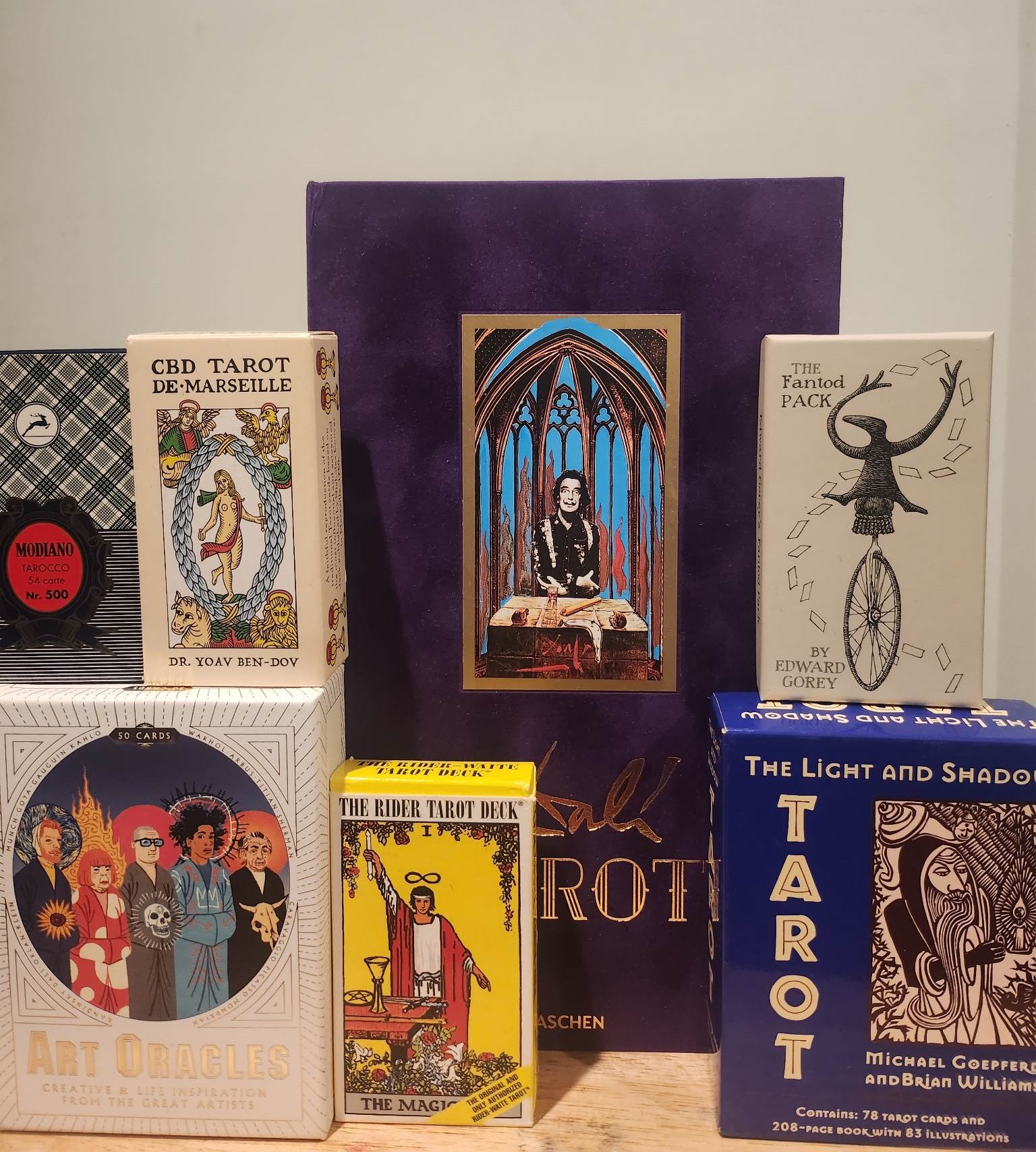

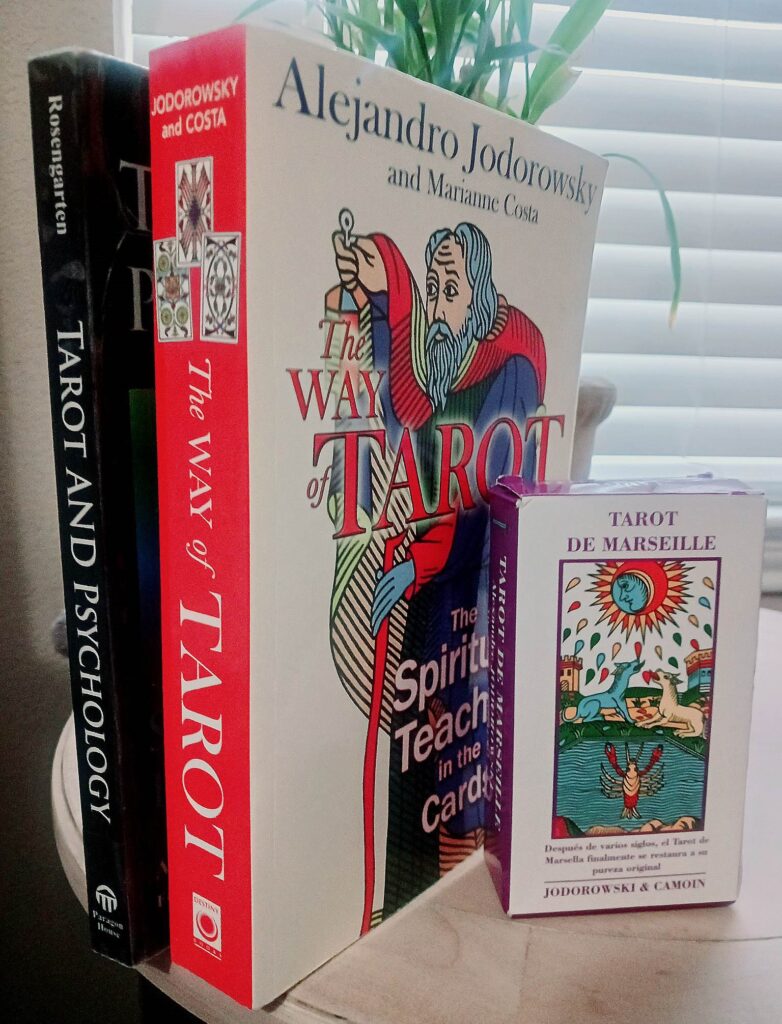
Some of O F’s tarot decks.
PO: I have the Jodorowsky Tarot deck.
OFC: I don’t think I’ve seen the Jodorowsky one yet, I have his book.
PO: Which is also interesting because you posted on Instagram in front of the Thirteenth Arcanum, but that’s from the Jodorowsky deck cos no other deck has those specific elements.
OFC: I went to see an artist’s exhibition of the guy whose name I’m forgetting (Jamie Hewlett), he did Tank Girl and then he moved on to the Gorillaz…
Do you know who I’m talking about?
PO: Yes, but I don’t know his name.
OFC: So I got to go to one of his art exhibitions and a bunch of me and my friends took a bunch of pictures of us hugging him, we were like, ‘It’s the guy!’
So that was one of his pieces.
PO: That is crazy!
OFC: But he is also a very well-read man – I’m not gonna put it past him to have done an homage to Jodorowsky.
Also, I have the Dali deck, this is my favourite one right now.
PO: I looked through that, it’s a very beautiful deck, I just don’t see how anyone can read with them, everything is so amorphous, but I’ve also not been doing it very long.
Are you able to read with it?
OFC: My style is mostly psychological, using the psychological model, so using it as a Rorschach test, so it might be that I like the amorphous aspect of it.
PO: What is your take on the fortune-telling aspect, since that makes up the majority of Tarot?
OFC: So, once again, I use the psychological model to define all of this stuff, so my analysis of it is that what people often say when you ask them about the fortune-telling aspect which is that it is a self-fulfilling prophecy.
Ok, well in that case, then it’s either – I think actually Arthur Edward Waite says this in his Tarot book as well where he says if that’s true then if you’re asking it if you’re going to find a lover, and it says yes then you are, because now you have more confidence. Or is that Crowley?
To be fair, they might have been riffing off each other. So yeah, it’s going to give you the confidence to find a lover or if you read into it that you’re going to go on vacation, then it’s much more likely that you’ve been thinking about that vacation or that you do kind of need a vacation.
I guess the opposite of that is if you get the Tower and you’re really really nervous about something going wrong then, I mean, stress happens, stress comes and goes into your life, right?
So you’re either feeling stress in that moment and it’s going to come to a head, anyways, or you’re feeling stress and you can prepare yourself to avoid that.
PO: So do you use Crowley’s deck?
Cos you do talk about it in ‘Backmask.’
OFC: I actually fucking hate Crowley’s deck.
I’m so sorry, I can’t stand the way it looks.
PO: Some of it is pretty cool and provocative, but it is probably the most abstract thing I’ve ever seen.
I don’t see how anybody could get a narrative out of those.
OFC: I do like some of his iconography, but not all of it.
PO: Does that weave into mind-control?
Does Tarot or Crowley play a part at all in ‘Backmask’?
OFC: There’s Crowley in it, the title chapters are actually Tarot, Major Arcana themed.
Crowley is an influence in ‘Backmask’ but like for the characters, so the plot of ‘Backmask’ – do you know who Joe Meek is, or was rather?
He was a British music producer who was one of the very few people in the 1960s who’s producing not only pop music without lyrics – although some of his songs did have lyrics – but he was one of the few who was making atmospheric pop music and who was also using some of the first digital synthesizers and digital, what’s the word I’m looking for, effecting the tapes themselves to create a new sound.
So, he is most famous for this song called ‘Telstar.’ But there is this story about how he was not very well after World War Two, he was a gay man in Britain when it was still illegal, so he was also very very messed up from that, and he was constantly talking about how he had visions and he could see the future and eventually he died by shooting himself and his landlord.
So that was the basis for the inspiration for this character who is not Joe Meek although he is a gay man who was in World War Two, kind of messed up from that, carries a lot of guns, and is also completely convinced that he can see the future, and he claims that he has this vision of a nightclub all full of fog where they’re playing “evil-sounding” music, and he’s like it’s not actually evil, it’s pop music, but we’re going to use this iconography, and the only reference that I have as an older man in the 1960s is Aleister Crowley!
So yeah, he’s trying to invent goth music in the 1960s, essentially. He’s like this music scene is not making me any money, I need to get the jump on everybody else, and I can see the future.
So that’s what I’m going to use.
PO: Switching gears, is the short piece ‘Schadenfreude’, not included in ‘Lockdown Laureate,’ based on a true story?
Did you work in a law firm?
OFC: (Laughs) Yes, oh yeah!
PO: I’m assuming most of your character study pieces are bits of what has happened to you or people you know.
OFC: It depends.
PO: Is ‘Junkie,’ which does appear in ‘Lockdown Laureate’, from your own experience?
OFC: Mix and match of experiences that I have had and also when you are a junkie you see other people doing things, and you’re like oh Jesus Christ, you just add that to the file of reasons why you want to be clean.
PO: Is the therapist in that story part of your experience or a construct for the story to weave in addiction – which is a thread that connects ‘Lockdown Laureate’?
OFC: (Laughs) I should go to therapy.
It’s basically, the therapist itself is more of my own rational talk back where I’m like, obviously coffee is not the same thing, so please relax; and it’s like, is it?
PO: I’m drinking coffee right now.
OFC: (takes a sip of her coffee) I have a straight-edge friend who is always making fun of me and Ian McKay for talking about how he never does any drugs but is constantly slamming Coca-Colas.
PO: That corn syrup is the worst.
So, is that video of the skier getting his head snapped, from ‘Junkie,’ is that real?
OFC: Yeah, it is.
It’s a real video of the skier. It’s a GIF.
I think it’s like from the old days of forums and 4Chan, I don’t know where the fuck to find it.
It was intense.
PO: If your death becomes a GIF, that’s the worst.
OFC: Dude, it’s true.
PO: Did you show somebody, that’s the last line of the book?
Did you show it to somebody to see their reaction?
OFC: You know I probably watched it with my best friend in high school, but I don’t remember that.
(Laughs) Sorry.
PO: So, going back to ‘Schadenfreude,’ that was real, that happened, have you ever slept on a bag of remotes?
That was one of my favourite lines.
OFC: She (Niobe) actually said that.
PO: Comparing having sex with a skinny guy to sleeping on a bag of remotes?
OFC: I used to write down some of the shit that she said, cos I was just so terminally bored that I had a notepad and I would just write on it, cos I couldn’t go on my phone, and I couldn’t play solitaire or anything, so I would just be automatic writing next to me and sometimes she would say something wild, and I’d be like ‘That’s going on the pad.’
PO: I identified with that because I’m a really thin guy and I’m like ‘What?!’
Now I’m getting self-conscious.
That one really stuck out and I had to ask you about it.
OFC: Listen, tall skinny men: statuesque, alright.
PO: Do you have anything coming out after ‘Backmask’?
OFC: Yeah, I’m working on another fantasy book for Evan, which is going to be using a lot of the same fantasy mechanics that I was working on in ‘Lord of Thundertown.’
I feel it’s a little bit more grown up now because I have been doing a lot more reading into the history of the development of occultism. You know I’ve read my Crowley, I’ve read my Waite, I’ve read my Jodorowsky. And I’m using a much less tangible model than I was in that first book, and we will see if I am stretching a little bit out too far for my current level of talent or not.
I’m still waiting for Evan to actually tell me if he likes it or not.
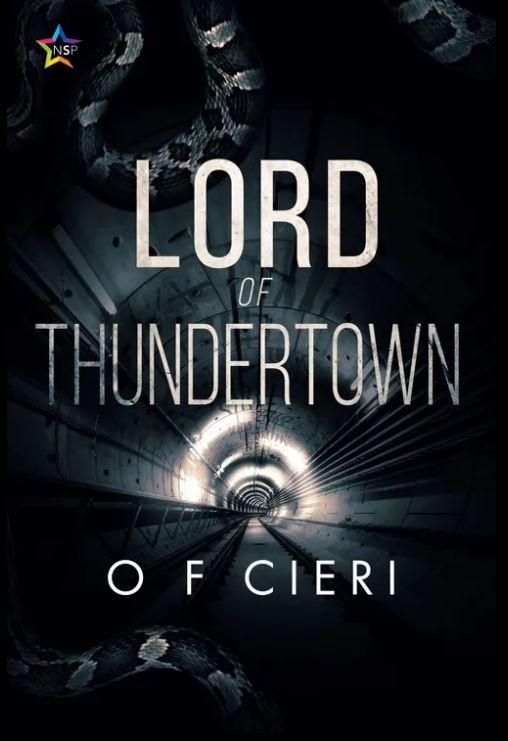
Released in 2020 by Nine Star Press.
PO: Is he a critical editor?
OFC: I actually think he could stand to be a little bit more critical.
Put that down.
I don’t mind feedback.
PO: Would you say you have thick skin?
OFC: No, but I think I’m working on it.
PO: Would you donate your body to the body farm if they were ethical with it?
OFC: (Laughs) No, but only because my goal is to be pumped so full of chemicals that I come back out of the ground a thousand years later, completely uncorrupted.
PO: So you want to be pickled like the communist leaders?
OFC: Yes. (Laughs)
I did not know this until I started following a couple of historian Twitter accounts, but did you know that they apparently took a bunch of Lord Byron’s hair and skin, because they were already aware that cloning would be a possibility in the future, eventually? In the late 1700s!
Yeah, and they were like we’re saving these so that in the future people can clone you, I’m dead serious, that’s why we have just hair and nail clippings from Lord Byron.
PO: I have not heard that!
OFC: They’re in museums!
We have Lord Byron’s dandruff.
PO: He was a narcissist, right?
We’re playing with fire; it’s going to be like Jurassic Park.
OFC: I was about to be like the only thing that I would give him is that he wasn’t a big fan of actually running things, but they did try to crown him king of Greece.
He’s the only foreigner in modern history to have won this special award that the Greek nation has for valour in war. Cos he was very much in favour of their right to be an independent nation.
PO: I saw on Instagram you recently visited Paris.
How come you didn’t visit Jim Morrison’s grave?
OFC: I was just running out of time… So when I landed in Paris like trying to get to the AirBnB – I was only there for a day.
Cos I was there originally to visit Oscar (Wilde) and they are on opposite fucking sides of the fucking graveyard because Oscar was broke so Robbie couldn’t get them a good tomb on the cool side cos there’s actually a side where everyone is, like all of the people that you can name, and they had to gradually build out, so the section where all of the cool people are is obviously much more expensive than the section where Robbie finally managed to get them a plot.
PO: Did you see any other graveyards in Paris?
OFC: No, and I do really regret it.
I also realized only a couple of days ago, do you remember that they recently unlocked the apartment of this woman who was a socialite (Madame de Florian) in the early 1900s? And she asked for her apartment to be sealed as a time capsule for a hundred years.
They opened it up a bunch of years ago, it was more like 2012 (2010) that they opened it, but I only realized a couple of days ago that I could have seen that!
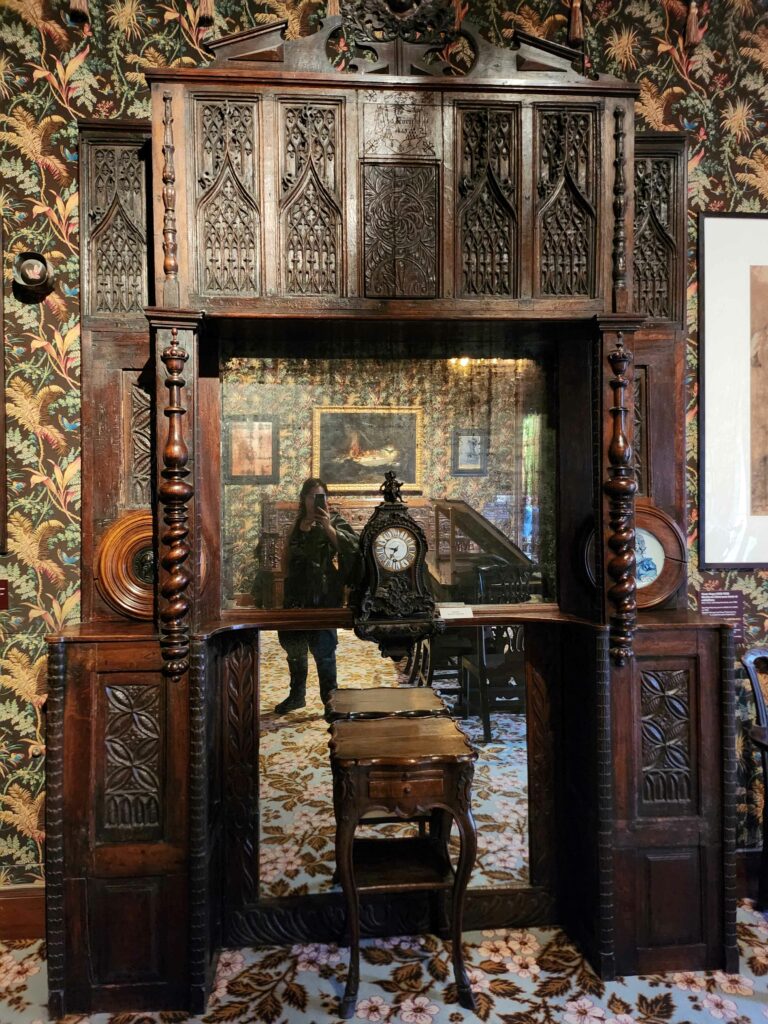
PO: What are your thoughts on the internet?
From a couple pieces in ‘Lockdown’ it seems to me it both inspires and disgusts you.
OFC: I think of the internet as a big space with people in it. Generalizing it seems limiting. There are different corners with different experiences.
Even now that ‘the internet’ has been monopolized into a handful of social media sites, everyone can handle each one in a totally different way. Most people I see with negatives views on ‘the internet’ turn out to have curated a bad time for themselves on one specific site.
PO: Regarding the short story ‘Out of Context’ in ‘Lockdown Laureate,’ which centers around a girl doing ASMR, do you yourself watch/listen to ASMR?
OFC: Umm, you know, not really. I’m familiar with it, I have seen different channels and I am very surprised there are some ASMR channels that have celebrity status.
Which was kind of the inspiration for that piece.
PO: That’s one thing I’ve thought a lot about.
At what point do you stop producing positive content and become your own pimp?
OFC: I think you have to be a one person everything and that includes being there for strangers, you know.
PO: So where do you think the line is, the moral line to where it starts becoming toxic and pornographic?
Not just including OnlyFans but any kind of content.
OFC: I mean that’s a question that’s been open for hundreds of years, it is a question of pornography, but doing more research into English literature as it has taken off since the invention of the Gutenberg press, even before that probably, there was always this question between the public and the personal, and previously people were much more protective of their personal selves and it was only – This one book that I read actually claims that the distance happened during the Enlightenment period and a little bit after that.
Very specifically he blames the earthquake that happened in Lisbon in the 1700s which kind of destroyed this idea of a gentle loving God that created all things as they’re supposed to be. Which was what Voltaire responded to when he wrote ‘Candide.’ Which even has the Lisbon earthquake in it.
PO: It is interesting that you say they became disillusioned with God being all benevolent.
God even says in the Bible ‘I make peace and create evil.’
OFC: It’s the distinction between the Old Testament and the New Testament where God originally is the only thing that you’re supposed to focus on, which means he can be incredibly malevolent, as Christianity was trying to recontextualize monotheism they were trying to give it a human face to make it something you could personally have a relationship with.
That started to become an issue that they had to deal with, so they kind of weeded it out with including this folk character of an adversary, which did exist it’s just it became a much more prevalent part of the theology.
PO: What makes you mad?
What puts fire in your belly?
OFC: People being really really stubborn – like if I’m trying to talk to them and they keep shooting me down over and over again. I’m gonna fuck up a motherfucker, and just start screaming, waving my arms around, I’m not comprehensive anymore.
Yeah, so constantly being stonewalled.
I guess gaslit is kind of a mean word, but you know what I mean.
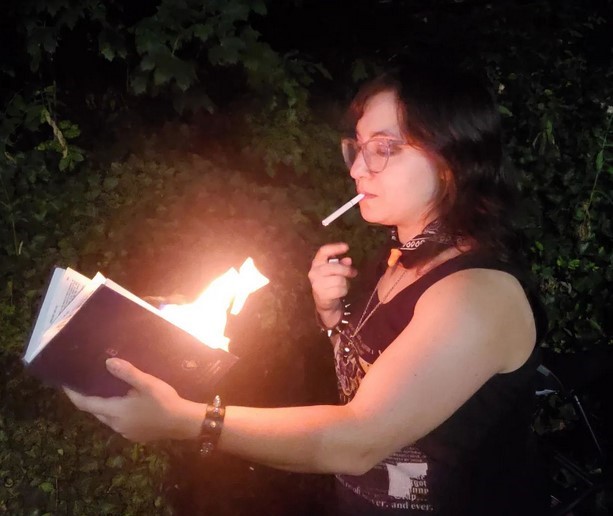
PO: Oh yeah.
Has this happened recently?
OFC: Yeah.
PO: I’m sorry to hear this.
OFC: It’s okay.
PO: What are you reading now?
OFC: A lot of things.
I’ve got a Scribd account.
I’m allowed to wear my headphones at the factory, which is great cos I really don’t need to pay attention, I just put stuff in the mailers and I ship them out. I’ve read ‘Candide’, I’ve read ‘The Iliad.’ The problem with Scribd is they don’t have that many titles when you’re looking for new stuff…you know what I’m firing my way through ‘The King in Yellow’ by Robert Chambers, it’s a classic.
PO: It’s not ringing a bell.
OFC: H.P. Lovecraft used it as direct inspiration for his work and the more you read it the more you realize how much he borrowed from him.
I read Arthur Machen who is another one of H.P. Lovecraft’s inspirations and I usually recommend him to people who talk about Lovecraft because he – you know that thing that people complain Lovecraft does where he says it’s ‘indescribable’ and that’s the end of the story? Machen is much much much better at getting that.
I know that a lot of people say that they like the way Lovecraft does that even if it does get on other people’s gears, but if you’re looking for a different way of doing that exact same thing Machen is really good at it.
PO: A bit of a confession, I have never read H.P. Lovecraft.
OFC: Here are two alternatives – you can read Robert Machen or Robert Chambers.
It’s been really interesting to me to realize that entire early 20th century sci-fi and fantasy genre came directly out of the Decadent movement, I’ve been really fascinated with that the past couple of months.
PO: Are you a Lena Dunham fan?
OFC: No. Not at all, I fucking hate her.
PO: Cos I heard you read ‘Gossip Girl’ and I wondered if you watched just regular ‘Girls.’
OFC: No, so it’s not that I read ‘Gossip Girl’ cos I didn’t read ‘Gossip Girl.’ I had two friends who got kicked out of the school that was the original ‘Gossip Girl’ school, Chapin school. And basically what happened was that these were girls who were not scholarship girls, but they weren’t old school money and they were in the bathroom at the same time that two girls who were old school money who were caught doing blow in the bathroom.
And so they couldn’t expel these two other girls, just couldn’t do it, but they could expel Claudia and Bella.
And they would talk all the time about what was true and what was false in the ‘Gossip Girl’ series.
PO: Did the story ‘Arbitrary’, from ‘Lockdown Laureate,’ happen in real life?
OFC: Yes.
She was just crazy.
PO: So was it just one of those things where you’re just walking down the street, starry eyed and out of nowhere…
OFC: No, she was crazy from the start she had always been, she was walking really slow, and she wasn’t down the street, we were in the subway, we were trying to get to a connecting train and I was like, ‘Get the fuck out of my way.’
And she starts going, ‘Don’t touch me, how dare you, get away from me.’ And I’m like, ‘I’m not doing anything to you.’ And it was just like back and forth, it gets really really dramatic and really trashy where I’m just like, ‘Fuck off!’ She’s screaming back at me, ‘FUCK YOU!’
We’re screaming at each other. I pushed her, she fell down, and she went, ‘No! Gosh! No, please! Oh, please!’
And then the cops showed up.
PO: I’m just kind of amazed the response time of the police.
OFC: There’s a station in the station.
And also there’s a lot more cops in the station these days.
PO: Yeah, I imagine.
I’m glad it was grist for the mill.
OFC: That was definitely one of those things where I was like, ‘Fuck you, bitch I’m gonna use this to make art!’
PO: And you’ve had no contact with her since?
OFC: I don’t know her, no.
I actually did see her name in the paperwork and I think I still have the paperwork somewhere, but I don’t know who she is, she’s a random stranger.
PO: I imagine you’ve probably taken that train since then.
Are you on the lookout, like, ‘Is crazy here?’
OFC: Yeah, I do, but again I haven’t ever seen her again so that’s one of the reasons why I was like; well maybe she was visiting her kids or something.
But it’s also a big city and you often don’t see people twice.
PO: What good movies have you recently seen, and good music you’ve listened to?
OFC: I’m actually really really terrible at movies which is why I’m going to tell you right off the top that the last movie I saw was ‘Netrikann.’
I am trying to get better at watching movies and I follow up on people who are really good at watching movies. And I have figured out that the problem I have with movies is that I really can’t watch it on my computer.
I don’t have the attention span; I always end up doing something else.
I don’t have an alternative right now except for going to a movie theatre and I don’t always have the time, the money, or the interest to do that.
So, music.
I’m much better at music.
PO: I’ve read your concert reviews, they’re very enjoyable!
OFC: I’ve got a new one out right now, I’m just waiting for them to post it.
The most recent bands I’ve gone to see are Sun Rot, Diva Car, Catch Slut, and Imperial Triumphant.
Sun Rot have been around for over a decade, I know those guys, they’re really cool, they’re friends of some friends. They put on a really fucking good show.
Everyone else I’ve never seen before but they were amazing.
I am going through a very weird phase right now where I’ve got Nick Cave and the Bad Seeds and then a bunch of classical music and they’re on repeat right now. As well as ‘I Don’t Care’ (she means ‘I Love It’) by Icona Pop. And Hammerhead – It’s a good song, check it out. It’s electronic though.
PO: Who are your favourite writers?
OFC: I really like Vernon Lee, her stuff is great.
Living writers I really like Chris Isaac, I’m always trying to get him to get more attention.
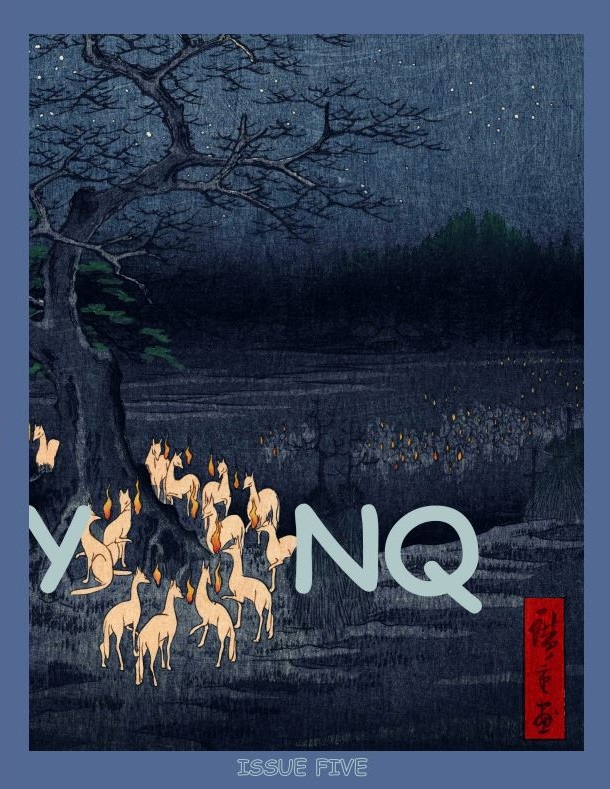


Various anthologies that have featured O F’s writing. Namely: YONQ issue 5, which featured her tale ‘Arbitrary;’ Witchcraft Magazine issue 8, which featured ‘Chemical Bond’; & Batshit Times Vol 3, in which appeared ‘Thieflime.’
PO: You’re a fan of Kerouac?
OFC: I do know Kerouac.
His stuff is a little bit too dense for me, I actually prefer Burroughs. I like the dream logic, the twisted symbolism a lot more.
I also like Hunter S. Thompson, I like the poor man’s Bukowski, I’m sorry, sue me.
That’s the kind of person I am.
PO: Have you seen ‘Naked Lunch’?
OFC: Yes. That’s such a fucking good movie.
I guess I should also mention that I’m a big Wilde fan!
PO: I will recommend a book, if you want an analysis on ‘The Portrait of Dorian Gray.’
Check out the book ‘Unholy Hungers’, maybe you might see a connection between the hungry ghost metaphor you use in ‘Schadenfreude’ and this vampiric mythological creature.
OFC: So, it’s interesting that you say that because Oscar’s wife who – they were good friends – I always want to add that when I’m talking to people about him.
She joined the Order of the Golden Dawn because W.B. Yeats was one of the original members and they were good friends. So, he encouraged Constance to join.
And there was this other woman who was named Countess Anna de Brémont who was committed to the Golden Dawn at the same ceremony as Constance. And so, in her memoirs where she discusses hanging out at Tite Street at the Wilde’s house a couple of times. Not close friends, but definitely friends. And she says that ‘The Portrait of Dorian Gray’ is very explicitly a thought piece on the nature of the law of attraction. So, whatever you want you put out into the universe and it comes back to you.
So that’s why Dorian has to say out loud, ‘Oh, if only I could stay the way this portrait looks and the portrait ages for me.’
PO: What is your take on the Law of Attraction, and sending a spell out into the universe like that?
OFC: I think that Oscar had a really good analysis of it because he was really into, not only the Greek myths and their idea of fate and destiny, but he also equated it a lot with his father’s research into Irish folklore cos his father was an anthropologist – An anthropologist under duress because he was trying to record folk stories as the Irish potato famine was happening, so he was from West Ireland and he was watching that entire countryside get literally wiped out.
And the introduction to his book is his complete devastated paranoia that there was not going to be anyone left in the province to pass on their traditions anymore which is why he was writing it down and he even says, ‘I know that writing it down kills it, but it’s going to die anyway so I’m going to write it down.’
So, he was combining this idea that fate isn’t one single thread, and he has this line, one of his pithy quips that he manages to combine a whole bunch of his philosophy into a couple of phrases where he says, ‘When the gods wants to punish a man they give him everything he wants.’
And I really like his concept of paradox and contradictory ideas being the true lens that you see reality through, where you get the good with the bad at the exact same time.
PO: Wow, that’s heavy!
OFC: (Laughs) You got me talking about Wilde, what is wrong with you?!
PO: I know, I was opening a Pandora’s Box.
Going off that, what would be a perfect world where you have everything you wanted, now you have nothing to work towards, now it sucks?
OFC: That’s also another complicated question because you have to get a sense of who you are before you can get a sense of what you want.
Because nothing in the world ever truly settles, it’s always constantly changing. You get the bare bones exact definition of what you wanted and then all of the impurities that come with it existing in the real world and of affecting that and influencing the actual experience of it.
And so, you need to deal with that as well, you need to readjust to deal with the actual reality of the situation.
And so there is no way to settle on perfect, even ground, a perfect image.
PO: You were an archaeology student.
What is the extent of your background in archaeology?
OFC: So I was inspired by working at Obscura to try to focus in early modern history and specifically the development of scientific thought as a subject for archaeology. So, kind of a little bit of what Michel Foucault was trying to do, but much more materialistic.
So he was mostly looking at theory whereas I wanted to look at theory and practice at the same time. Which once again that worked really well with Obscura cos I was actually selling calipers and stuff, ya know.
It’s difficult to actually do that when you’re just taking a B.A. in a college that has just an anthropology degree and you have to do the anthropology work, but all of my professors were always really supportive of it. They were like, ‘Oh okay, take care of the basics and you can work on that in a couple of months.’
They were always telling me that one of the side effects, good and bad at the same time, of taking an anthropology course at CUNY was that it wouldn’t fill up all of the credits that I needed to get a B.A. So I would need to take supplementary classes no matter what. And that could include early modern history.
PO: Is archaeology going to play a part in anything you’re putting out in the future?
OFC: Yeah, it’s definitely going to be a much bigger part in the next book.
PO: Have you been on any digs?
OFC: No, but I really want to, the problem with dig school is you actually need to pay for it all. So, like transportation, hotel costs, and then also the tuition for the dig school as well.
A lot of people don’t get to go to field school, it’s very expensive. There are scholarships for the school itself, but that’s still a vacation, it’s like a two month long vacation.
PO: Where would you go if you could choose any place to dig?
OFC: Dude, the fucking skies the limit, I wouldn’t be able to settle on anything.
Do I want to dig in Italy? Do some Roman digs? Do I want to do it in Egypt? Do I want to do it in Mexico?
My wife’s family is always telling me that I could do it in Sri Lanka, and then I could stay with the family, and then I’d be able to see the homestead.
PO: How’s Gordo doing?
OFC: Gordo is well. My frog!
He holds my charger, my phone charger, my outdoor phone charger that I take with me, because I’m paranoid about my phone dying. He’s a very common taxidermy piece, he’s a cane toad and they’re an invasive species all over the world. They are in Florida, they’re in Australia where it’s death on site. They actually – the government pays you for a pound of toads, like of cans.
They’re originally from the Philippines and I’ve got some friends in the Philippines who say that they also just take them out as fast as possible over there.
So, they’re very common taxidermy pieces and they’re often turned into coin purses.
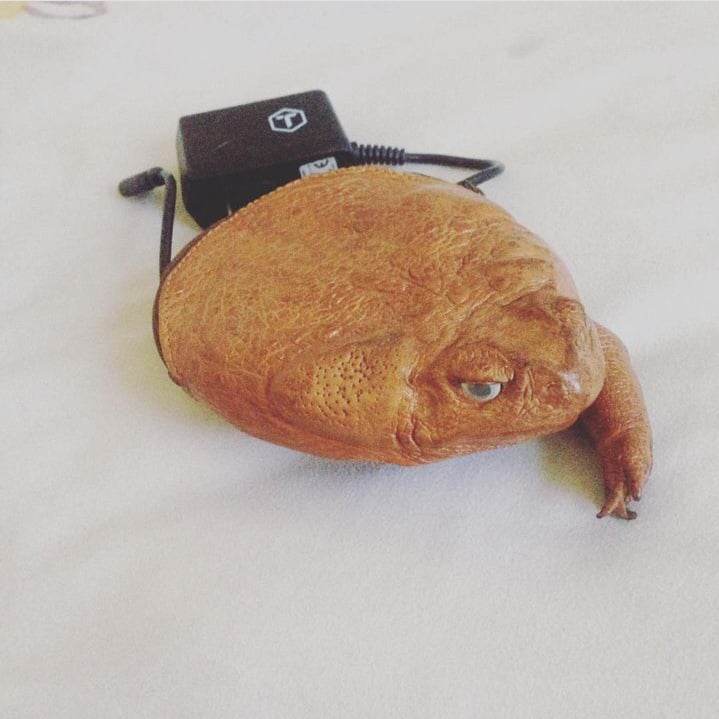
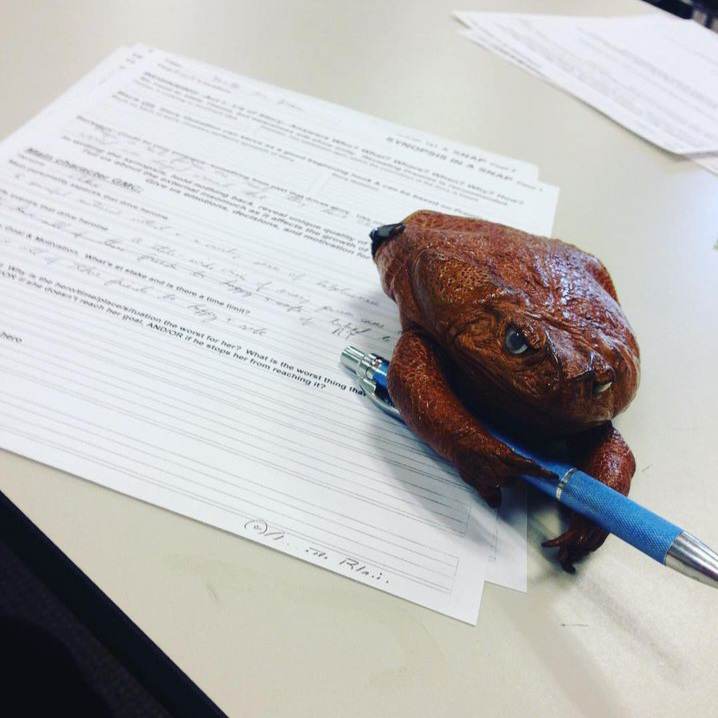
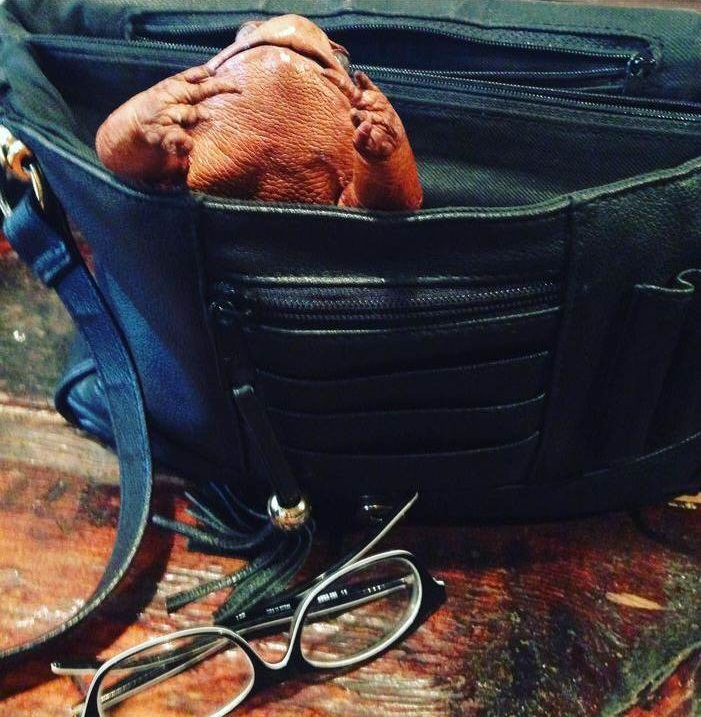
Various photos of OF’s much loved taxidermy cane-toad, Gordo.
PO: You say you don’t know movies very well, but you have seen ‘Ghost World?’ – That is a very good movie.
OFC: I have seen ‘Ghost World.’
Did I post about that, when did I post about that?
PO: I’m not telling you.
OFC: Goddamn, dude. Spooky.
PO: You talked about it on a podcast.
OFC: Oh, okay, got it.
I have seen ‘Ghost World’ and I have talked about it I just didn’t know if it was on my Twitter nine years ago or something.
PO: Have you seen ‘American Splendour?’ Another comic book type movie.
OFC: I tried it and I didn’t enjoy it and I didn’t enjoy the comic either.
Do you know the sequence in ‘American Splendor’ where Harvey Pekar is talking to the audience? I think it’s closer to the end and it’s this high point where he thinks he collapses and then the scene goes into his dream world where he’s talking in the comic.
So, in ‘American Splendor’ this is basically a direct translation of a sequence in ‘American Splendor’ (the comic) where it’s Harvey Pekar, he’s looking directly out of the panel at the reader and he’s talking about how he pees in his car, and how the kids at school used to make fun of him…
I actually don’t think it’s a technically brilliant piece by Robert Crumb, it’s kind of boring, it’s difficult, it’s monotonous. I guess the technical aspects is that he manages – he stays consistent, and it’s a very detailed, very well-worn style, all of his cross-hatching and stuff. But it’s not very visually interesting. It was revolutionary for its time, but looking back on it I’m not impressed.
PO: Do you read a lot of comics or graphic novels?
OFC: Actually, a couple of years ago – since you listened to a bunch of the podcasts you probably heard me talking about how I was really struggling to talk about my influences at the time, but since then I have learned that the style of comic books that were being written in the 1980s and the 90s in DC, Marvel and much more independent comics was called the British Invasion.
And it was very much seen as a legitimate movement in school, in the style of writing, and I was hesitant to say that at the time because I wasn’t sure if it counts as quote unquote “real writing.” You know what I’m talking about: Grant Morrison, Alan Moore, Warren Ellis, Neil Gaiman, all of those people have very much, since then, been reverse recognized as people who really did change the genre of writing.
So I definitely read all of those when I was a kid and I read web comics as well, and there were a lot of good comics that were trying to do something similar or trying to build off of that along with a lot of other styles of writing that were popular in the early 2000s.
I’ve stopped doing that, but I miss it, ya know…
I’m still following ‘Kill Six Billion Demons’ and that’s still a great fucking comic. Check it out, it’s so good!
PO: Would you ever do a comic?
OFC: I don’t know if I would anymore, once upon a time that was the goal.
Tarot Reading
PO: My question for the Tarot – What is hindering me from reaching my potential?
OFC: (Lays out the cards) This one was pretty good.
I did a Celtic Cross reading because that’s the spread I’m most familiar with.
Arthur Edward Waite designed this spread to have the first card, the Significator, reflect the querent. To that end he expected the reader to get to know the querent and intentionally pick a face card based on not only the vibe of the querent, but also the one closest in physical resemblance to them. I’ve never seen anyone do that before, but it does mean there are two cards in the spread meant to signify the querent.
I’ve made the distinction that the first signifier card is you alone, and the second one you in relation to the problem.
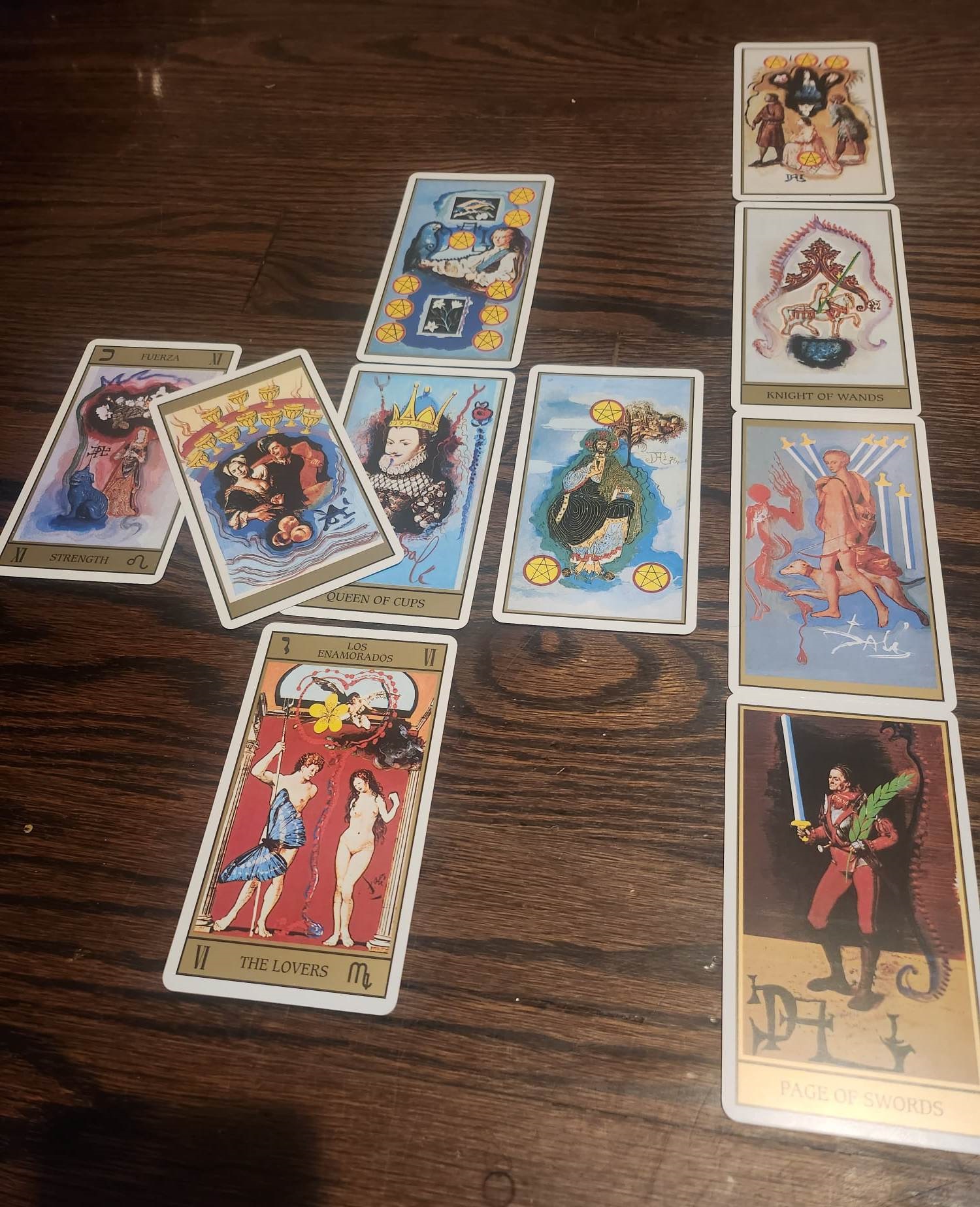
1. Queen of Cups
The Queens in Dali’s deck are the head of each suit, so the Queen of Cups is the final authority on the cups, which in this deck signify subconscious forces such as passions and emotional depths.
She’s therefore in complete control over her own mental reserves, but the moustache is a nod to Marcel Duchamp’s Mona Lisa, to remind the querent not to take this too seriously.
2. Ten of cups
Ten cards represent the conclusion of the suit. Whatever the suit is offering, this is the culmination of those pursuits.
This second card is the obstacle card, though Waite mentions that a good card can represent a benign barrier. The ten of cups represents contentment and satisfaction, though Dali takes care to point out that the rainbow suspending the cups can also represent a barrier keeping new perspectives or opportunities out, no matter how much we may be enjoying the solitude.
3. Nine of coins
This is the crowned card representing your ideal, or the highest achievement of your goals.
Nine cards aren’t the full completion of the suit, but offer necessary space to grow.
Coins are traditionally symbols of materialism or monetary gain, though Dali also uses a psychological model for his tarot and restricts the coins to personal growth or gain. That being said, the nine of coins represents accomplishment with a further desire to grow. He notes that this card specifically comes from a desire to share what you’ve acquired.
4. Los Enamorados/the lovers
The Major Arcana is the only part of this tarot in Spanish. For some reason the book is only in English, French and German.
Very annoying for me.
Anyways, the fourth card is below the Significator and symbolizes the roots the querent has to grow out of. The lovers card symbolizes sex and love, obviously, but more broadly symbolizes a decision and its consequences. (Dali notes that the baby up top is a reminder of what happens after sex.)
If this is about a romantic situation then the meaning is on the surface, but in this reading it’s a reminder that you have already made decisions and the consequences are underway.
5. Three of coins
This is the card behind the Significator and represents choices the querent has already made. This one shows Jesus going out on the road and traditionally represents being on the journey you decided on.
Behind him is his past and the future is out of frame.
Three of coins are traditionally good cards just because all humans everywhere have always agreed that triangles look cool. I’ve also heard readers point out that it’s two of something, and a little extra. Just one more than you expected.
6. Fuerza/strength
This is the card looking ahead, and fittingly enough it’s the strength card, encouraging mental fortitude for whatever trials are ahead.
Dali gave you everything you need for the journey; a beautiful woman for the inner strength to maintain yourself and a beast for protection.
7. Page of Swords
This is the second Significator card I mentioned, and in a traditional Celtic cross reading this would be the card representing the querent that I would leave up to chance, but again, nobody does it that way anymore.
Instead, this card represents you in relationship to the question.
Once again, Dali used the psychological model for his tarot deck, so all the suits represent different mental facilities.
In this case, the swords are your mental defences, whatever you use to protect yourself.
The Page of Swords is weighing a sword with an olive branch, picking the weapon he wants to use. The demon of consequences is behind him, but as the lowest house card in the suit there’s a lot of room to grow for him.
Dali suggests:
“Remain mentally fit.
Look for rewarding tasks and challenges.
Exploit your humour and your charm.
Discover a new lightness of being.
Avoid made-up statements and arguments.
Work in a creative and attentive manner with the images that are in your head and the heads of others.“
8. Seven of swords
This is your ‘house card’, or your mental environment at the moment.
It might represent how you prepare to answer the question on your own, or how your environment responds to the issue you brought up.
It shows Diana, pierced by five swords with two are her disposal, hunting a shapeless red form.
Dali uses the sword suit to represent the shadow self pretty frequently. In this card he explains that this card is about facing our inner being, second self. He actually avoids talking about negative aspects of the self pretty often. This makes sense since he was such a notorious egotist, meaning he instead encourages embracing all our qualities unflinchingly.
From the dead man himself we get:
“The best way to broaden our minds is to look at familiar things from a different perspective!
This occurs quite naturally when, on returning from a vacation, we see our familiar surroundings in a different light.
Similarly, when we are in love, hurt, angry, or relieved, we suddenly see the word through new eyes.
The card challenges you to do what often happens spontaneously on purpose.“
9. Knight of wands
When I was a kid I had a reader explain that the wind and fire elements switch between the sword and wand suits depending on what the deck designer thought was the source of strength; mental fortitude or physical strength.
In a tarot based on the psychological model it makes sense that Dali would use the wands suit to represent the querent’s ability to enact change on their environment, whereas the swords suit is mostly a caution about causing damage.
The ninth card in the Celtic cross represents hopes or fears, although given my interest in contradictions I read this as hopes AND fears.
The Knight of Wands carries an enormous staff and is surrounded by an aura of violet flames. His horse stands on a cosmic toad.
Dali says:
“All these symbols have one common denominator: “Become who you are!” For this card is your life’s mission.“
Self-actualization was important to Dali as a tool to enact change, but in the hopes and fears section we also need to consider the consequences of that. The symbols are ridiculous, and the figure of the knight is miniscule.
Usually, a fear of self-actualization is a fear of ridicule or failure. Dali notes that our life’s tasks take a lifetime and require all our strengths to reach completion.
Sometimes, knowing who you are and what you have to do is barely the start of the process.
A life’s mission can be exhausting.
10. Four of coins
The final card doesn’t have a neat, clean definition to slot into. It’s the sum total of the reading and requires the most focus to culminate the story.
Fours are even numbers, but Dali portrays it here as a pyramid turned upside down, balancing on its point. The buddha statue in the centre represents the foundations of your beliefs and values, which he warns can be a source of strength but also incredibly dangerous.
To contradict the last card, this one warns against playing either, “the hero or the loser! Do not waste your time with show-offs or yes-men.
Every human being possesses something unique that is his and his alone. Neither good nor bad behaviour will help you to succeed.
You will advance only by developing your greatest talents.“
Hope this helps!
Let me know if you want another card drawn for clarity.
PO: There was a lot to contemplate on this.
I will say I probably identify with the Page cards more than any other (especially Cups).
And the fear of ridicule and failure of the King of Wands I would say is accurate, I think this has held me back quite a bit.
There’re many questions I could ask but I think the one I would want clarity on is regarding the last one, the Four of Coins. I have many interests and also abilities/creative desires I’ve neglected to develop – this is perhaps connected to the King of Wands?
What does the Tarot say about which talents to focus on?
Since that seems to be the key to successfully move forward.
OFC: One of the reasons why I enjoy the psychological model of tarot reading is that it allows the reader and the querent to treat the deck and cards like an art piece with symbolism related to the designer’s body of work.
For example, looking at the original Waite-Coleman deck, Waite describes the Four of Coin (pentacles in his deck) as pure material fulfillment. In this one the even four number gives a sense of stability and security, and Coleman depicted the lone figure on the card as holding on to all four coins with hands and feet.
Waite, unlike Dali, used the oracular model to design his deck, though part of his work with tarot included a quasi-anthropological collection of all previous writing on tarot. For the sake of providing an accurate record, Waite offers an alternative reading of the 4 of coins as the querent expecting something further.
Not necessarily monetary.
In Dali’s version the coins symbolize the querent’s ability to form their own perspective on the material. For the four of coins specifically he says that it’s a card that symbolizes the ability to create your own world, solid and consistent enough to live in.
He cautions against putting too much faith in hard data, but mentions that this is a card of completeness, of being able to restructure and discard things that aren’t appropriate anymore. For that purpose, he recommends focusing on useful talents, or talents that heighten communication and bring people closer to you.
A lot of this reading was about an ongoing path, which can be re-interpreted as you having room to grow.
If you feel hesitant because of all the options available to you, then I would argue that this card could be read as a statement on that.
This card could be read as encouraging you to try all your options and to make mistakes, since you’re coming at them from a secure position.
I’m glad you liked this reading, I thought it was a very interesting draw.
PO: Thank you!
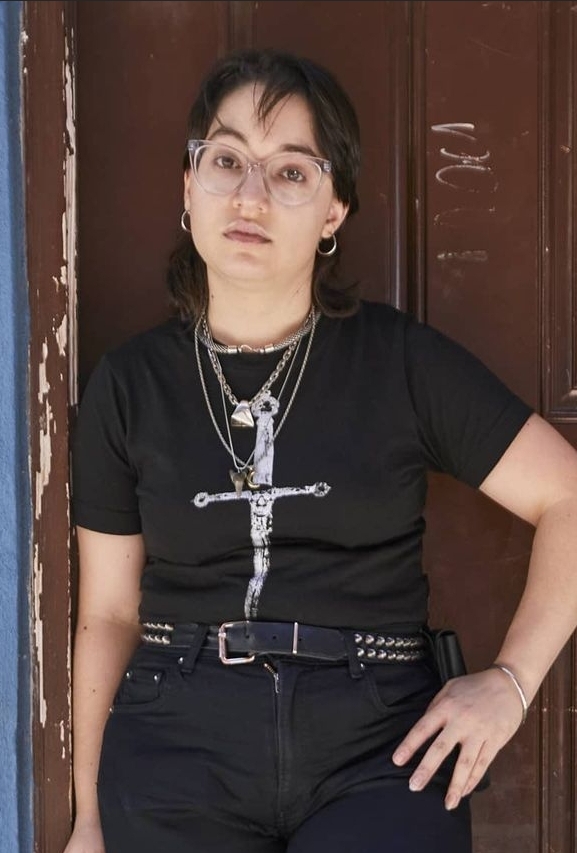
Photo by Jae Mercado.
Links
- O F Cieri – Website
- O F Cieri – Instagram
- O F Cieri – twitter
- O F Cieri – Facebook Author Profile
- O F Cieri – Goodreads Author Profile
- O F Cieri – Link to Buy ‘Lord of Thundertown’ via Ninestar Press
- O F Cieri – Link to Buy ‘Lockdown Laureate’ via Castaigne Publishing
- O F Cieri – Link to read her work ‘Suicide Pact’ via Anti Heroin Chic
- O F Cieri – Link to read her work ‘Schadenfreude’ via Fugitives & Futurists
- O F Cieri – Link to read a sample from her upcoming book ‘Backmask’ via Malarkey Books
- O F Cieri – Link to listen to ‘Beach Bay Carnival Grind’ via Episode 12 of ‘The Lurking Transmission’ podcast
- O F Cieri – Review of ‘Lockdown Laureate’ via The Aither
All images supplied by O F.
